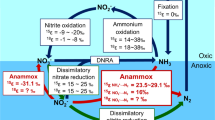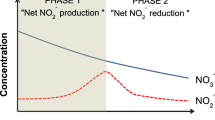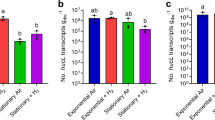Abstract
THE occurrence of hydroxylamine as an intermediate of the enzymatic reduction NO3− → NH3 or oxidation NH3 → NO3− has recently interested many biochemists1. Thus certain authors have been able to confirm the formation of this compound in the process of the oxidation or reduction of nitrogen compounds2,3.
This is a preview of subscription content, access via your institution
Access options
Subscribe to this journal
Receive 51 print issues and online access
$199.00 per year
only $3.90 per issue
Buy this article
- Purchase on Springer Link
- Instant access to full article PDF
Prices may be subject to local taxes which are calculated during checkout
Similar content being viewed by others
References
Lees, H., Nature, 169, 156 (1952). Lindsey, G. A., and Rhines, C. M., J. Bact., 24, 489 (1932). Lemoigne, M., de Somer, A., and Crosen, M., Bull. Soc. Chim. Biol., 33, 1423 (1951).
Novak, R., and Wilson, P. W., J. Bact., 55, 517 (1948).
Egami, F., Yamada, T., and Taniguchi, S., Résumés des communications du IIe congrès international de biochimie, Paris, 78 (1952).
Author information
Authors and Affiliations
Rights and permissions
About this article
Cite this article
TANAKA, M. Occurrence of Hydroxylamine in Lake Waters as an Intermediate in Bacterial Reduction of Nitrate. Nature 171, 1160–1161 (1953). https://doi.org/10.1038/1711160c0
Issue Date:
DOI: https://doi.org/10.1038/1711160c0
This article is cited by
-
Millimeter-scale vertical partitioning of nitrogen cycling in hypersaline mats reveals prominence of genes encoding multi-heme and prismane proteins
The ISME Journal (2022)
-
The determination of hydroxylamine in Ethiopian rivers and lakes
Mikrochimica Acta (1975)
-
Über die Änderung der Stickstoffbilanz flüssiger Nährböden durch einige in Oberflächenwasser vorkommende Bakterien
Zeitschrift für Hygiene und Infektionskrankheiten (1961)
Comments
By submitting a comment you agree to abide by our Terms and Community Guidelines. If you find something abusive or that does not comply with our terms or guidelines please flag it as inappropriate.



